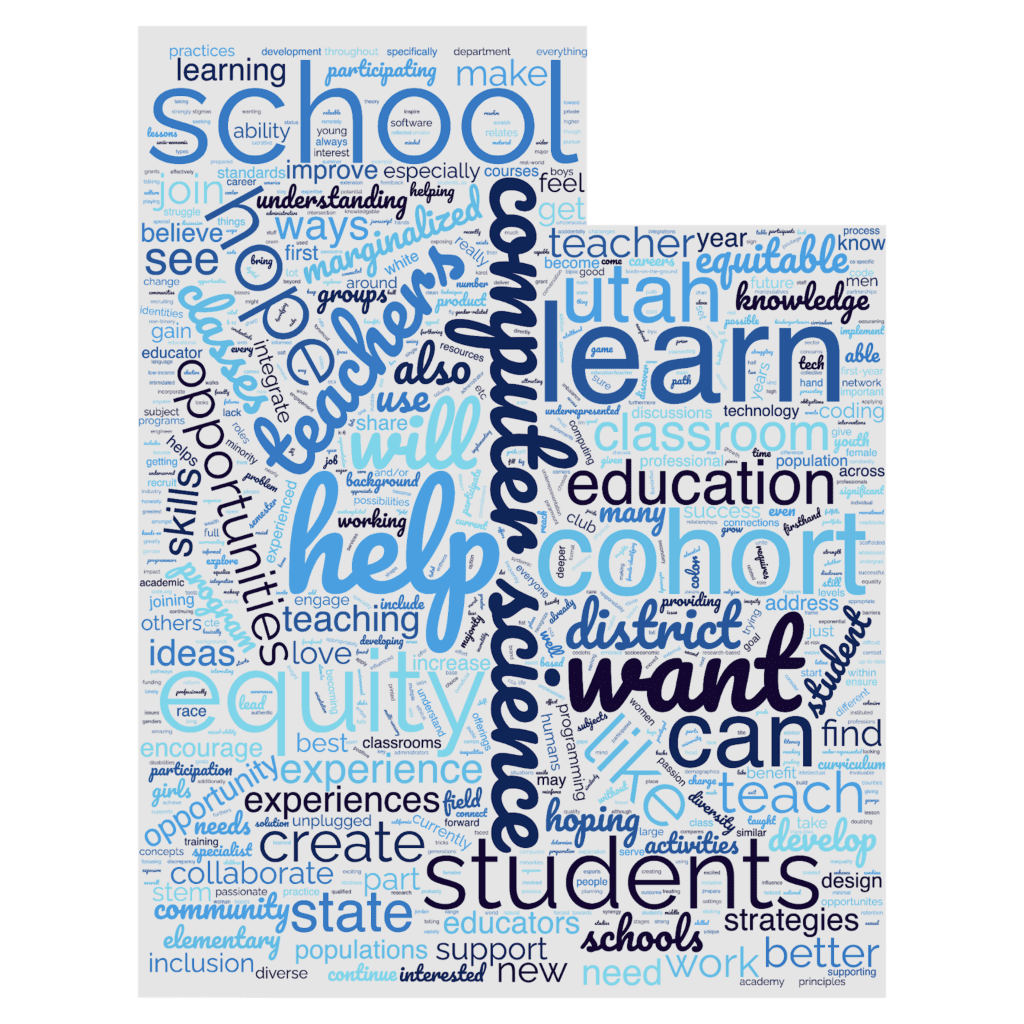About 50 K-12 computer science educators in Utah were selected to join the Utah CS Equity Cohort, to further develop their knowledge and ability to address inequities in CS. About 40 educators completed the robust professional development (PD) program between January and August 2023. This program used a hybrid approach to PD, with asynchronous, online work and live community of practice meetings facilitated by other Utah teacher leaders. Cohort members demonstrate growth as effective and inclusive teachers and also as equity-focused leaders in their communities.
Goals
PD specifically seeks to improve the inclusive teaching practices and equitable outcomes of CS teachers in Utah. This is needed given the equity issues outlined in the Utah Computer Science Education Master Plan (see p. 34). This PD will address many of the recommendations (pp. 34-36), especially #6: “Identify and implement successful strategies for increasing diversity in K-12 CS education.” Participants learn how to create equitable and inclusive CS classrooms, develop a close and connected community of Utah educators committed to disrupting inequities, and showcase teachers who successfully model equitable teaching practices.
Activities & Timeline

- Sept. – Nov. 2022: Revised curriculum. Developed schedule and confirmed program logistics.
- Nov. – Dec. 2022: Identified and trained two facilitators who are experienced CS teachers and equity-focused PD facilitators in Utah. Launched application and promoted widely.
- Jan. 2023: Selected 54 participants. Held virtual orientation meetings to kickoff the program.
- Feb. – June 2023: Each month, participants completed about 2 hours of asynchronous work in an online PD course prior to joining a live, 1.5-hour community of practice meeting, where they collaboratively processed the content, shared best practices, and engaged in courageous conversations about equity issues impacting their communities. Participants developed an action plan to implement in their classrooms next fall.
- July 2023: Participants attended the CSTA Annual Conference along with a colleague, joining sessions aligned to their action plans, plus in-person, local meetups to build community.
- Aug. 2023: Participants built community while sharing their action plans, what they learned, and other best practices at an in-person program close-out.
* See the participants’ digital digest for a very detailed view of activities across the year.
Participants

We selected 54 participants, which represented an experienced (average of 11 years teaching experience, 5 years of CS teaching experience) and diverse group of CS educators across Utah:
- gender: 63% are women, 35% are men.
- race: 85% are white, 7% are Latinx, 4% are Asian, 4% are Indigenous or Native Hawaiian.
- role: 87% directly teach CS (most also teach other subjects), 13% train/support CS teachers.
- grades: 46% teach elementary, 50% teach grades 6-8, 46% teach high school (9-12).
School Reach
71% of participants teach in public schools. They represent 15 different school districts, in addition to 7 public charter schools and 3 private schools. 87% teach high concentrations of one or more marginalized student populations (e.g., 26% teach in a rural community, 44% teach at a Title I school or where >40% students are from low-income families). View an interactive directory.
Teacher Intentions
Participants have a strong commitment to disrupt inequities and a desire to learn best practices:
- “I want to learn about the key equity issues in CS, so I can use the knowledge and skills to be part of the change that must take place. I want to learn how to address the inequities in CS, also with this knowledge and understanding, I can use it to help change.”
- “I would love to have resources and ideas to help encourage students who traditionally have not participated in Computer Science. What can I do as the teacher to encourage these students to take these classes? How can I help them feel successful so they want to continue?”
- “Many of the students that struggle the most in my school are Latinx, and I really want to help understand this issue more and be a part of the solution.”
Feedback

We have received overwhelmingly positive feedback from participants in monthly surveys:
- 98% were satisfied
- 100% reported a safe and welcoming environment
- 95% felt more connected to a teacher community
- 88% increased their knowledge of equitable and inclusive teaching
- 78% reported concrete takeaways to apply to their teaching practice
This course helped me grow in ways I didn’t expect. I feel brave enough to have conversations about inclusion, equity and diversity where I wasn’t ready to have those conversations beforehand.
— Library media specialist
It was amazing! Thank you for such a great time. I didn’t know what I was getting into when I signed up, but it has been a great experience that has and will enhance my classroom immensely.
— High school CS teacher
Overall this was a wonderful cohort, our facilitators were amazing and so talented in what they do. I enjoyed all the Coursera coursework and I think the cohort addressed a lot of great topics that are typically taboo and difficult to discuss.
— 4th grade teacher
I have very much appreciated these conversations and the information contained in this course. It has very much helped my understanding of how to increase equity in my classroom.
— 5th grade teacher
This program is a collaboration between:


